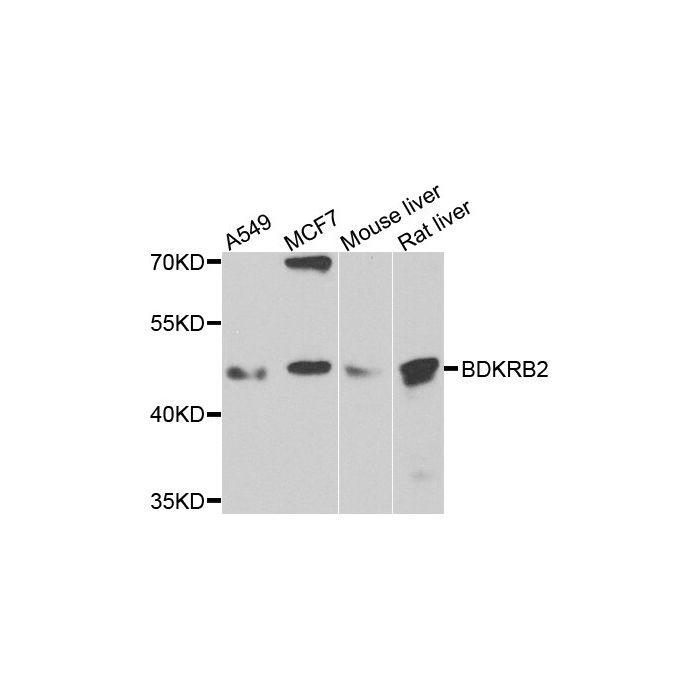BDKRB2 polyclonal, anti-human, mouse, rat
€388.00
In stock
SKU
BS70516
Background:
This gene encodes a receptor for bradykinin. The 9 aa bradykinin peptide elicits many responses including vasodilation, edema, smooth muscle spasm and pain fiber stimulation. This receptor associates with G proteins that stimulate a phosphatidylinositol-calcium second messenger system. Alternate start codons result in two isoforms of the protein.
Alternative Name:
B2 bradykinin receptor, B2R, BK-2 receptor, BDKRB2, BKR2
Application Dilution: WB: 1:500 - 1:2000
Specificity: BDKRB2 polyclonal antibody detects endogenous levels of BDKRB2 protein.
Immunogen:
Recombinant protein of human BDKRB2.
MW: ~ 44 kDa
Swis Prot.: P30411
Purification & Purity:
The antibody was affinity-purified from rabbit antiserum by affinity-chromatography using epitope-specific immunogen and the purity is > 95% (by SDS-PAGE).
Format:
1mg/ml in PBS with 0.02% sodium azide, 50% glycerol, pH7.3.
Storage:
Store at 4°C short term. Aliquot and store at -20°C long term. Avoid freeze-thaw cycles.
For research use only, not for use in diagnostic procedure.
This gene encodes a receptor for bradykinin. The 9 aa bradykinin peptide elicits many responses including vasodilation, edema, smooth muscle spasm and pain fiber stimulation. This receptor associates with G proteins that stimulate a phosphatidylinositol-calcium second messenger system. Alternate start codons result in two isoforms of the protein.
Alternative Name:
B2 bradykinin receptor, B2R, BK-2 receptor, BDKRB2, BKR2
Application Dilution: WB: 1:500 - 1:2000
Specificity: BDKRB2 polyclonal antibody detects endogenous levels of BDKRB2 protein.
Immunogen:
Recombinant protein of human BDKRB2.
MW: ~ 44 kDa
Swis Prot.: P30411
Purification & Purity:
The antibody was affinity-purified from rabbit antiserum by affinity-chromatography using epitope-specific immunogen and the purity is > 95% (by SDS-PAGE).
Format:
1mg/ml in PBS with 0.02% sodium azide, 50% glycerol, pH7.3.
Storage:
Store at 4°C short term. Aliquot and store at -20°C long term. Avoid freeze-thaw cycles.
For research use only, not for use in diagnostic procedure.
| Is Featured? | No |
|---|
Write Your Own Review

